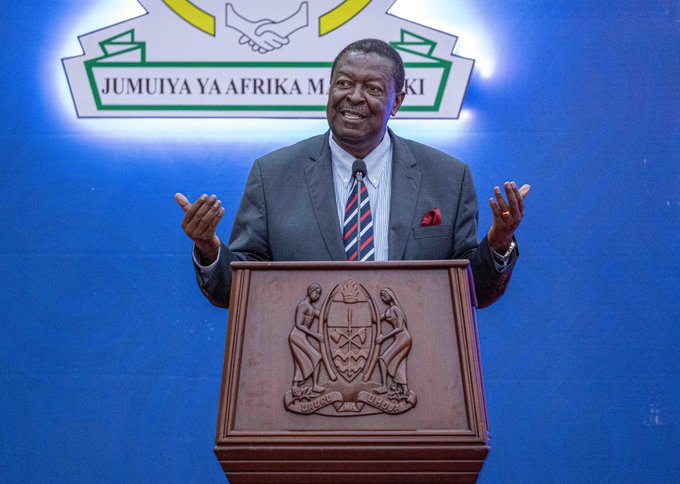
Negotiation only way out of conflict in DRC – Mudavadi
Kenya has joined other member states of the East African Community (EAC) and the Southern African Development Community (SADC) in calling for a cessation of hostilities and a ceasefire in the conflict-prone eastern Democratic Republic of Congo.
Prime Cabinet Secretary Musalia Mudavadi says Kenya is eager to bring all stakeholders to the negotiating table as a means to facilitate a return to normalcy in the DRC. He believes the only way forward is to abandon endless fighting and give dialogue a chance.
“Peace is not like instant coffee; you cannot brew it. We have a golden opportunity as the EAC and SADC to assist the people of DRC,” Mudavadi remarked at a Ministerial meeting in Dar es Salaam concerning the conflict situation in eastern DRC.
He asserted that embracing urgent peace initiatives is essential not only for eastern DRC but also for both regions and Africa as a whole.
“As we seek a joint resolution following numerous earlier initiatives, we must recognize that insecurity and conflicts in one region can escalate and destabilise the entire world,” Mudavadi stressed
Mudavadi, who also serves as the Foreign and Diaspora Affairs Cabinet Secretary, regretted that the prolonged conflict in eastern DRC has already claimed countless lives and continues to displace countless civilians, affecting children, women, and persons with disabilities.
He warned that the conflict is rapidly evolving into other forms of threats to human security and dignity, including sexual exploitation, abuse, and gender-based violence as a method of war, as well as the illicit exploitation and trafficking of natural resources, a swelling war economy, and the erosion of state institutions and authority.
Mudavadi, who leads the EAC Foreign Ministers caucus, co-chaired the meeting with his Zimbabwean counterpart, Professor Amon Murwira, the Zimbabwean Minister of Foreign Affairs and International Trade, who also serves as Chairperson of the SADC Council of Ministers.
The meeting took place ahead of Saturday’s Heads of State and Governments Summit, which will be co-chaired by President William Ruto.
“This situation demands our immediate, collective, and sustained attention. In this way, we aim to respond in a timely manner to the immediate concerns of peace, humanitarianism, human security, and sustainable development,” he stated.
Highlighting the urgency of implementing key recommendations that will arise from the joint regional meeting, the Prime CS condemned the recent attacks on peace missions in DRC, calling them a stark affront to civility and a violation of the principles of multilateral collective security. he said the security situation in the DRC and its implications for regional and continental stability require urgent action.
“As we give dialogue a chance, there is need for all parties in the DRC to respect international law including the Vienna Convention on Diplomatic Relations and ensure the safety of diplomatic assets and personnel within the country, as well as uphold long-lasting legal and moral principles of respecting peace missions.” he noted.
Mudavadi reiterated that if the regional blocs fail to intervene and assist the DRC in stabilisation, a significant portion of the continent might soon be plunged into insecurity and continuous conflict.
“What is happening in DRC should prick our collective conscience to the view that insecurity in one part of the world ought to be considered as insecurity in the entire world and thus, all of us should collectively seek to address it. This, indeed, is one of the cardinal points of our current joint meeting.” Mudavadi stated
“This ministerial meeting and the Joint EAC-SADC Summit of Heads of State and Government must provide clear direction on how to best move forward regarding peace and security in our sister country,” he added.
Mudavadi explained that restoring peace and normalcy in conflict-prone regions of Africa will enable the continent to progress towards overcoming the existing threats posed by mercenaries and foreign fighters, whose activities often undermine the objectives of the African peace and security architecture.
He pointed out that the EAC and SADC already have two significant peace initiatives: the AU-led Luanda process and the EAC-led Nairobi process.
“These processes need to be harmonised and merged to eliminate overlapping elements and to be managed jointly, allowing for effective results to be achieved,” he said.
“A cohesive approach will significantly reduce the coordination challenges presented by multiple peace and security initiatives, which could ultimately work at cross-purposes and undermine the effective implementation of peace initiatives in Eastern DRC. Our goal is not adversarial but rather a unified position that will yield impactful and practical results,” Mudavadi explained.
